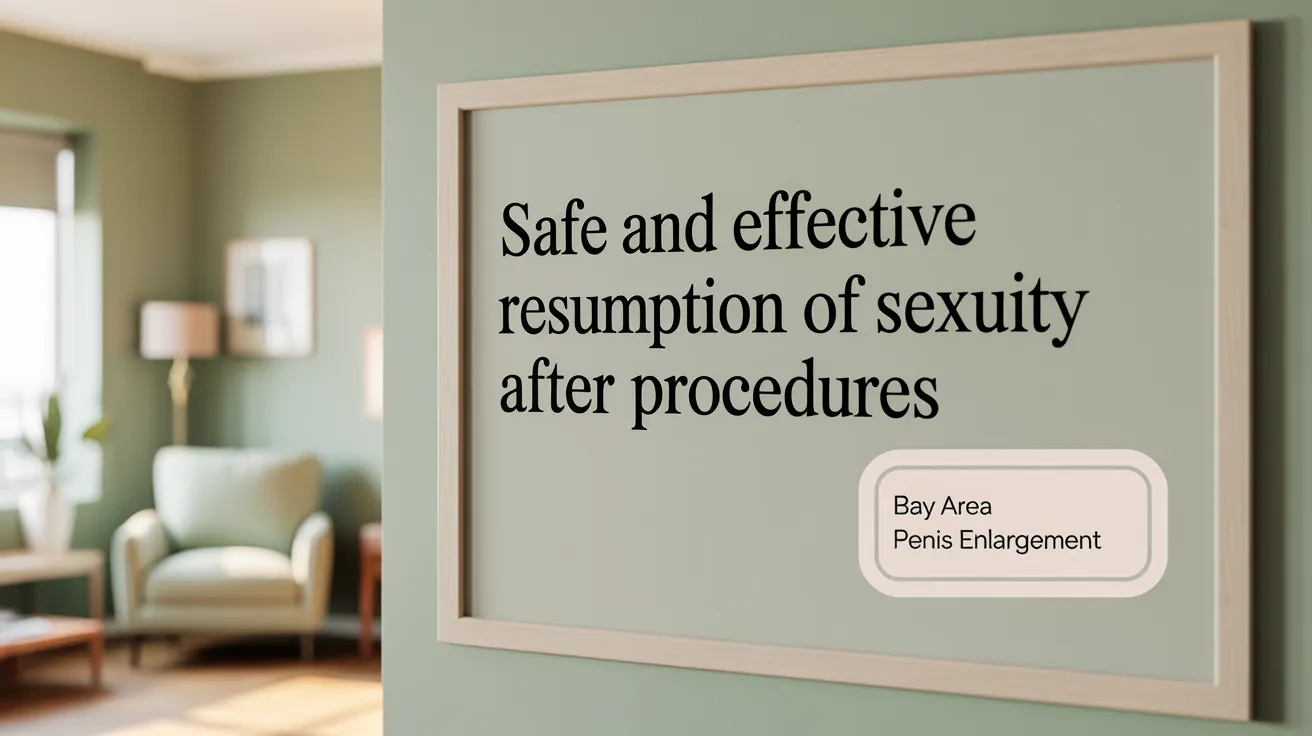Understanding the Importance of Sexual Health in Enhancement Procedures
Sexual health is a vital component of overall well-being, intricately linked to physical, emotional, mental, and social factors. As more individuals seek enhancement procedures — from surgical interventions like breast augmentation and penile implants to non-surgical treatments such as platelet-rich plasma (PRP) injections — it becomes essential to maintain and optimize sexual health before and after these treatments. This article explores best practices for care, recovery, communication, and lifestyle choices that support sexual function, satisfaction, and psychological wellness throughout the enhancement journey.
Maintaining and Improving Sexual Health Around Enhancement Procedures

To ensure sexual health is maintained and enhanced before and after procedures such as platelet-rich plasma (PRP) therapy, a holistic approach focusing on healthy lifestyle choices is vital. This includes maintaining a balanced diet rich in fruits, vegetables, lean proteins, and omega-3 fatty acids, which support blood flow and tissue repair. Regular physical activity, including cardiovascular exercises, boosts circulation and promotes overall vitality. Avoiding harmful habits like smoking and excessive alcohol consumption is essential, as they impair blood vessel health and delay healing (six lifestyle changes for better sexual function, Lifestyle and management options for sexual health).
Communication with healthcare providers plays a critical role throughout the process. Discussing expectations, concerns, and progress helps tailor treatments and manage outcomes effectively (Sexual Health and Overall Health). Post-procedure, adherence to medical instructions—such as avoiding strenuous activity initially and attending scheduled follow-up appointments—facilitates proper healing.
PRP therapy promotes tissue regeneration, enhances blood flow, and can increase size and sensitivity, with effects typically lasting several months up to over a year. The procedure is minimally invasive, with quick recovery time and negligible downtime (Male sexual health in Bethesda and Northern Virginia).
Sustaining these improvements involves ongoing healthy habits and periodic maintenance treatments if recommended. These strategies support long-term sexual wellness and satisfaction, ensuring that the benefits of enhancement procedures are maximized and lasting. Regular check-ins with healthcare providers ensure ongoing success and help address any concerns promptly (Sexual health benefits of lifestyle changes).
More information on maintaining sexual health with PRP therapy and lifestyle adjustments before and after enhancement procedures can be found with a search for "Maintaining sexual health with PRP therapy and lifestyle before and after enhancement procedures." Continuous attention to overall health, combined with professional guidance, can lead to satisfying and healthy sexual experiences.
Post-Procedure Care and Resuming Sexual Activity Safely

Proper wound care and hygiene are vital following any cosmetic or surgical procedures that impact sexual health. Patients should keep incisions clean and dry, following the specific wound management instructions provided by their healthcare provider. This includes regular inspection of the surgical site for signs of infection, such as increased redness, swelling, warmth, or unusual discharge. Maintaining good hygiene practices helps prevent complications like infections that can delay recovery.
Activity restrictions vary depending on the type of procedure. For minor outpatient surgeries under local anesthesia, patients may be able to resume sexual activity within a few days to a week. In contrast, more invasive surgeries such as body contouring, breast surgery, or reproductive organ procedures generally require a waiting period of approximately 4 to 6 weeks or longer. This timeline ensures proper healing of tissues and reduces the risk of wound disruption. For joint replacements like hip or knee surgery, most patients can typically return to sexual activity around 6 weeks, once incisions have healed and pain diminishes.
Guidance on safely resuming sexual activity should be individualized based on the procedure, healing progress, and overall health. Listening to one's body and avoiding positions that apply pressure on healing areas are essential. Communication with healthcare providers is crucial—patients should discuss their readiness with their doctor and follow specific instructions. Gradual reintroduction of intimacy, paying attention to any discomfort or adverse symptoms, minimizes risks and supports a healthy recovery.
Monitoring for complications such as signs of infection, persistent pain, or swelling is important during recovery. Promptly contacting a healthcare provider if any concerning symptoms develop can prevent escalation of issues. Psychological adjustment also plays a role; open and honest communication with partners can alleviate anxiety and foster emotional support as patients recover.
In summary, post-procedure care involves diligent wound hygiene, adherence to activity restrictions, thoughtful planning for sexual activity, and ongoing communication with healthcare professionals. Following these precautions helps ensure a safe return to intimacy while promoting optimal healing and long-term satisfaction.
Impact of Enhancement Procedures on Sexual Function and Psychological Well-Being

Enhancement procedures such as breast augmentation and gynecologic surgeries often lead to significant improvements in sexual satisfaction and overall psychological health. Studies show that women report increased arousal and sexual satisfaction months after procedures like breast augmentation, with many experiencing a boost in self-confidence and body image. This positive change can translate into more satisfying intimate experiences and better self-esteem.
Alongside physical benefits, many individuals notice enhanced confidence following cosmetic procedures. A better body image can reduce anxiety related to appearance, helping people feel more comfortable and relaxed during sexual activity. Improved self-esteem and body satisfaction are closely linked to higher sexual satisfaction and emotional well-being.
However, psychological challenges can also arise. Some individuals may face dissatisfaction if results do not meet their expectations, leading to frustration, disappointment, and renewed anxiety. Without proper preoperative counseling and realistic goal-setting, patients might develop unrealistic expectations that result in psychological distress.
Herbal and pharmacological enhancers are popular options for increasing sexual performance and desire, but they carry potential risks. Certain herbs and drugs may interact with medications or cause adverse side effects, such as cardiovascular issues or mood changes, affecting mental health and physical safety.
Proper counseling and patient education are crucial. Healthcare providers should guide patients on realistic outcomes, potential risks, and the importance of mental health support. When expectations are managed well and patients receive appropriate care, enhancement procedures can positively impact both sexual function and psychological well-being, leading to more fulfilling intimate relationships and improved quality of life.
Risks, Benefits, and Considerations of Common Sexual Health Enhancement Procedures

Sexual health enhancement procedures, such as penis enlargement surgery, breast augmentation, and gynecologic cosmetic surgeries, carry various physical and emotional considerations that patients should carefully evaluate.
Physically, these procedures can involve risks like infection, which may require prompt medical intervention. Scarring is another common concern, especially with surgical options, and can affect body image and sensation. Altered sensitivity or nerve damage may occur, potentially impacting sexual pleasure or function. Postoperative complications such as bleeding or unfavorable aesthetic outcomes are possible, and dissatisfaction with results can lead to emotional distress.
Despite these risks, many patients experience benefits including significant improvements in appearance, which can boost self-confidence and body image. For women receiving gynecologic cosmetic surgeries, there can be enhanced comfort during intimacy and an increased sense of well-being. Men who opt for penile enhancement or non-surgical girth procedures may report improved self-esteem and decreased performance anxiety.
It is important to distinguish between surgical and non-surgical options. Surgical techniques often offer more predictable and lasting results but come with higher risks and longer recovery periods. Non-surgical methods, such as platelet-rich plasma (PRP) injections or dermal fillers for penile enhancement, are minimally invasive and typically carry fewer risks; however, their efficacy is often unproven or limited, and outcomes may be temporary.
Before choosing any procedure, comprehensive preoperative assessments are vital. These should include evaluating overall health, understanding the realistic outcomes, and discussing potential complications with qualified healthcare providers. Psychological readiness and emotional implications should also be considered, as dissatisfaction or unmet expectations can impact mental health.
Ultimately, individuals should seek detailed guidance from well-trained professionals. Fully informed decisions that weigh physical, emotional, and psychological factors are essential to ensure safety and satisfaction. While these procedures can improve quality of life, they are not without risks, and expectations must be carefully managed.
For more detailed information, searching terms like "Risks and benefits of penis enlargement, breast augmentation, gynecologic cosmetic surgeries", "Women more sexually satisfied after breast augmentation", and "Gynecologic cosmetic surgery" will provide comprehensive insights tailored to individual concerns.
Managing Sexual Health Issues Related to Medical Procedures, Aging, and Cancer Treatment
Effects of urological procedures and cancer therapies on sexual function can be significant but are often manageable with appropriate, tailored interventions. For example, treatments such as radical cystectomy, prostatectomy, radiation therapy, or hormone therapy frequently lead to erectile dysfunction, decreased libido, or orgasmic difficulties. These effects result from nerve damage, vascular impairment, hormonal changes, or physical alterations caused by surgery or radiation.
Addressing these issues involves a variety of treatment options. Pharmacologic approaches like phosphodiesterase inhibitors (such as sildenafil or tadalafil) are commonly prescribed to improve erectile function. Hormone replacement therapy may help in cases of testosterone deficiency, and mechanical devices like vacuum erection tools can assist in achieving an erection. Surgical options, including penile implants, provide a long-term solution for severe cases unresponsive to other treatments.
Psychosocial support plays a crucial role. Counseling, sex therapy, and body image interventions help individuals cope with emotional distress, relationship challenges, and self-esteem issues resulting from treatment or aging. Routine assessments with validated tools enable healthcare providers to monitor and address sexual health concerns proactively.
A multidisciplinary care team—comprising urologists, oncologists, psychologists, and pelvic health specialists—is essential to optimize sexual health outcomes. This collaborative approach ensures comprehensive management that considers both physical and psychological aspects, helping individuals regain confidence and improve their overall quality of life.
Managing sexual health problems related to urological procedures, cancer treatments, or aging is a complex but achievable goal with personalized plans, ongoing communication, and support from specialized healthcare teams.
The Role of Education, Prevention, and Communication in Sexual Health Maintenance
Understanding and maintaining sexual health is essential for overall well-being, involving not only the absence of disease but also the promotion of pleasurable, safe, and respectful sexual experiences. Educational initiatives play a vital role in equipping individuals with knowledge about transmission, symptoms, and prevention of sexually transmitted infections (STIs). Comprehensive sexual health curricula and targeted lectures significantly improve awareness, leading to increased acceptance of practices such as condom use, regular STI testing, and vaccinations.
STI testing and vaccination protocols are critical preventive strategies. Routine testing helps identify infections early—often without symptoms—reducing the risk of complications like infertility, cancer, or HIV transmission. Vaccinations, including those for HPV, hepatitis B, and hepatitis A, provide effective immunity, reducing the overall burden of these illnesses.
Open dialogue between patients and healthcare providers is fundamental. Patients should feel empowered to ask specific questions about their sexual health, symptoms, and treatment options. Healthcare providers, in turn, must create a welcoming, non-judgmental environment by using inclusive language, asking respectful questions, and practicing trauma-informed care. This approach promotes trust, encourages honest communication, and helps ensure that individuals receive comprehensive, personalized care.
Barriers such as stigma, limited access to confidential services, and lack of education can hinder effective communication and prevention efforts. Strategies to overcome these challenges include provider training on cultural sensitivity, expanding access to confidential testing and vaccination services, and implementing public health campaigns tailored to diverse populations.
By prioritizing sexual health education, adopting preventative practices, and fostering open, respectful communication, we can significantly reduce STI incidences and improve the sexual health of adolescents and adults alike, paving the way for healthier, more satisfying lives.
Holistic Sexual Health for Lifelong Well-Being
Maintaining sexual health before and after enhancement procedures is a multifaceted endeavor that integrates physical care, psychological support, education, and open communication. Adhering to lifestyle modifications, following post-procedure guidelines, and engaging with healthcare providers enable individuals to maximize the benefits of enhancement treatments while mitigating risks. Recognizing the profound influence of body image and self-esteem on sexual satisfaction underscores the importance of realistic expectations and counseling. Prevention strategies including STI testing and vaccination, alongside patient-provider dialogue, foster a safe, informed approach to sexual wellness. Ultimately, a holistic, patient-centered plan that respects individual needs and promotes continuous sexual health supports improved quality of life and fulfilling intimate relationships throughout and beyond the enhancement journey.

